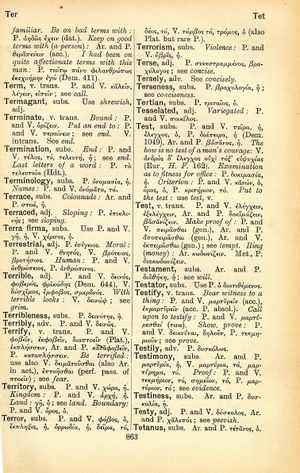tetanus: Difference between revisions
From LSJ
Χαίρειν ἐπ' αἰσχροῖς οὐδέποτε χρὴ πράγμασιν → Non decet in rebus esse laetum turpibus → In schlimmer Not ist Freude niemals angebracht
(3_13) |
(3) |
||
| Line 12: | Line 12: | ||
{{Georges | {{Georges | ||
|georg=tetanus, ī, m. ([[τέτανος]]), die Halsstarre, der Tetanus, Plin. u. Scrib. – Dav. [[tetanicus]], a, um ([[τετανικός]]), [[mit]] der Halsstarre [[behaftet]], Plin. 20, 239 u.a. | |georg=tetanus, ī, m. ([[τέτανος]]), die Halsstarre, der Tetanus, Plin. u. Scrib. – Dav. [[tetanicus]], a, um ([[τετανικός]]), [[mit]] der Halsstarre [[behaftet]], Plin. 20, 239 u.a. | ||
}} | |||
{{LaEn | |||
|lnetxt=tetanus tetani N M :: neck-cramp (Pliny) | |||
}} | }} | ||
Revision as of 06:56, 28 February 2019
English > Greek (Woodhouse)
subs.
Ar. and P. τέτανος, ὁ.
Latin > English (Lewis & Short)
tĕtănus: i, m., = τέτανος,>
I a stiffness or spasm of the neck, tetanus, Plin. 23, 1, 24, § 48; 31, 10, 46, § 122; Scrib. Comp. 101 (in Cels. 4, 3, written as Greek).
Latin > French (Gaffiot 2016)
tĕtănus, ī, m. (τέτανος), contraction des nerfs, crampe, tétanos : Plin. 23, 48 ; 31, 122.
Latin > German (Georges)
tetanus, ī, m. (τέτανος), die Halsstarre, der Tetanus, Plin. u. Scrib. – Dav. tetanicus, a, um (τετανικός), mit der Halsstarre behaftet, Plin. 20, 239 u.a.
Latin > English
tetanus tetani N M :: neck-cramp (Pliny)

